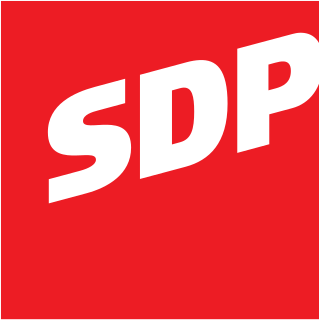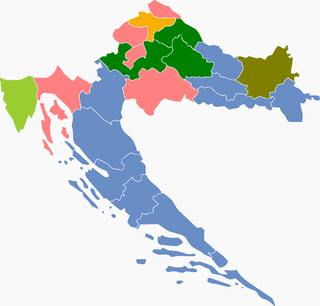The politics of Croatia are defined by a parliamentary, representative democratic republic framework, where the Prime Minister of Croatia is the head of government in a multi-party system. Executive power is exercised by the Government and the President of Croatia. Legislative power is vested in the Croatian Parliament. The Judiciary is independent of the executive and the legislature. The parliament adopted the current Constitution of Croatia on 22 December 1990 and decided to declare independence from Yugoslavia on 25 May 1991. The Constitutional Decision on the Sovereignty and Independence of the Republic of Croatia came into effect on 8 October 1991. The constitution has since been amended several times. The first modern parties in the country developed in the middle of the 19th century, and their agenda and appeal changed, reflecting major social changes, such as the breakup of Austria-Hungary, the Kingdom of Serbs, Croats and Slovenes, dictatorship and social upheavals in the kingdom, World War II, the establishment of Communist rule and the breakup of the SFR Yugoslavia.

The Croatian Parliament or the Sabor is the unicameral representative body of the citizens of the Republic of Croatia; it is Croatia's legislature. Under the terms of the Croatian Constitution, the Sabor represents the people and is vested with legislative power. The Sabor is composed of 151 members elected to a four-year term on the basis of direct, universal and equal suffrage by secret ballot. Seats are allocated according to the Croatian Parliament electoral districts: 140 members of the parliament are elected in multi-seat constituencies, 8 from the minorities and 3 from the Croatian diaspora. The Sabor is presided over by a Speaker, who is assisted by at least one deputy speaker.

The Social Democratic Party of Croatia is a social-democratic political party and the largest party of the Croatian centre-left. The SDP is one of the two major political parties in Croatia, along with the centre-right Croatian Democratic Union (HDZ).

The Istrian Democratic Assembly is a centre-left, regionalist, liberal political party in Croatia primarily operating in Istria County.

The Croatian People's Party – Liberal Democrats is a liberal political party in Croatia.
Regular elections in Croatia are mandated by the Constitution and legislation enacted by Parliament. The presidency, Parliament, county prefects and assemblies, city and town mayors, and city and municipal councils are all elective offices. Since 1990, five presidential elections have been held. During the same period, nine parliamentary elections were also held. In addition, there were six nationwide local elections. Croatia has held two elections to elect 11 members of the European Parliament following its accession to the EU on 1 July 2013.

Parliamentary elections were held alongside presidential elections in Croatia on 2 August 1992, the first after independence and under the new constitution. All 138 seats in the Chamber of Representatives were up for election. The result was a victory for the Croatian Democratic Union, which won an absolute majority of 85 seats. Voter turnout was 75.6%.

Dražen Budiša is a retired Croatian politician who used to be leading opposition figure in the 1990s and a two-time presidential candidate. As leader of the Croatian Social Liberal Party through the 1990s he remains to date the only Leader of the Opposition not to have been from either the Croatian Democratic Union or Social Democratic Party.
Coalition of People's Accord was the bloc of mostly moderate nationalist and liberal parties formed on the eve of first multi-party elections in Croatia in 1990.
The Zagreb crisis is the political crisis that followed the elections for the City of Zagreb local assembly held in October 1995. During the crisis the winning parties were unable to appoint their candidate for Mayor of Zagreb because the President of Croatia, Franjo Tuđman, refused to provide the formal confirmation of their decision.

Parliamentary elections were held in Croatia on 25 November 2007 and for overseas voters on 24 and 25 November. The campaign officially started on 3 November. The President of Croatia announced elections on 17 October and 14 days were allowed for candidate lists to be submitted.
The Zagreb local elections of 2005 were held on 15 May 2005 in Zagreb, the capital of Croatia. On the last local elections, in 2001, Milan Bandić had been re-elected as the mayor of Zagreb. However, a 2002 incident made him resign in favor of Vlasta Pavić, a deputy mayor chosen by Social Democratic Party, Bandić's party. Pavić remained formally in control of the city until 2005. However, she was moved down the list of candidates to the 16th place, returning the local candidacy to Milan Bandić.

The Mayor of the City of Split, colloquially the Poteštat, is the highest official of the Croatian city of Split. From 1990 to 2007 the mayor was elected by the city assembly. Since 2007 Croatian mayors are elected directly by the citizens. The first such election in Split occurred in 2009.

Parliamentary elections were held in Croatia on Sunday, 4 December 2011 to elect 151 members to the Croatian Parliament. They were the sixth parliamentary election in Croatia since independence.

Parliamentary elections were held in Croatia on 8 November 2015. All 151 seats in the Parliament were up for election. This parliamentary election was the 8th since the first multi-party election in 1990 and the first since Croatia joined the European Union in 2013. The ruling center-left Croatia is Growing coalition, led by Prime Minister Zoran Milanović, was challenged by the center-right Patriotic Coalition led by the HDZ and headed by its party chairman Tomislav Karamarko, and also faced several new political coalitions.

The 2013 Croatian local elections were held on 19 May, with the second round held on 2 June where necessary.

The Bridge of Independent Lists is a political party in Croatia founded in 2012. The party is led by Božo Petrov, its founder and the former Mayor of Metković and Speaker of the Croatian Parliament from 14 October 2016 to 5 May 2017.




















